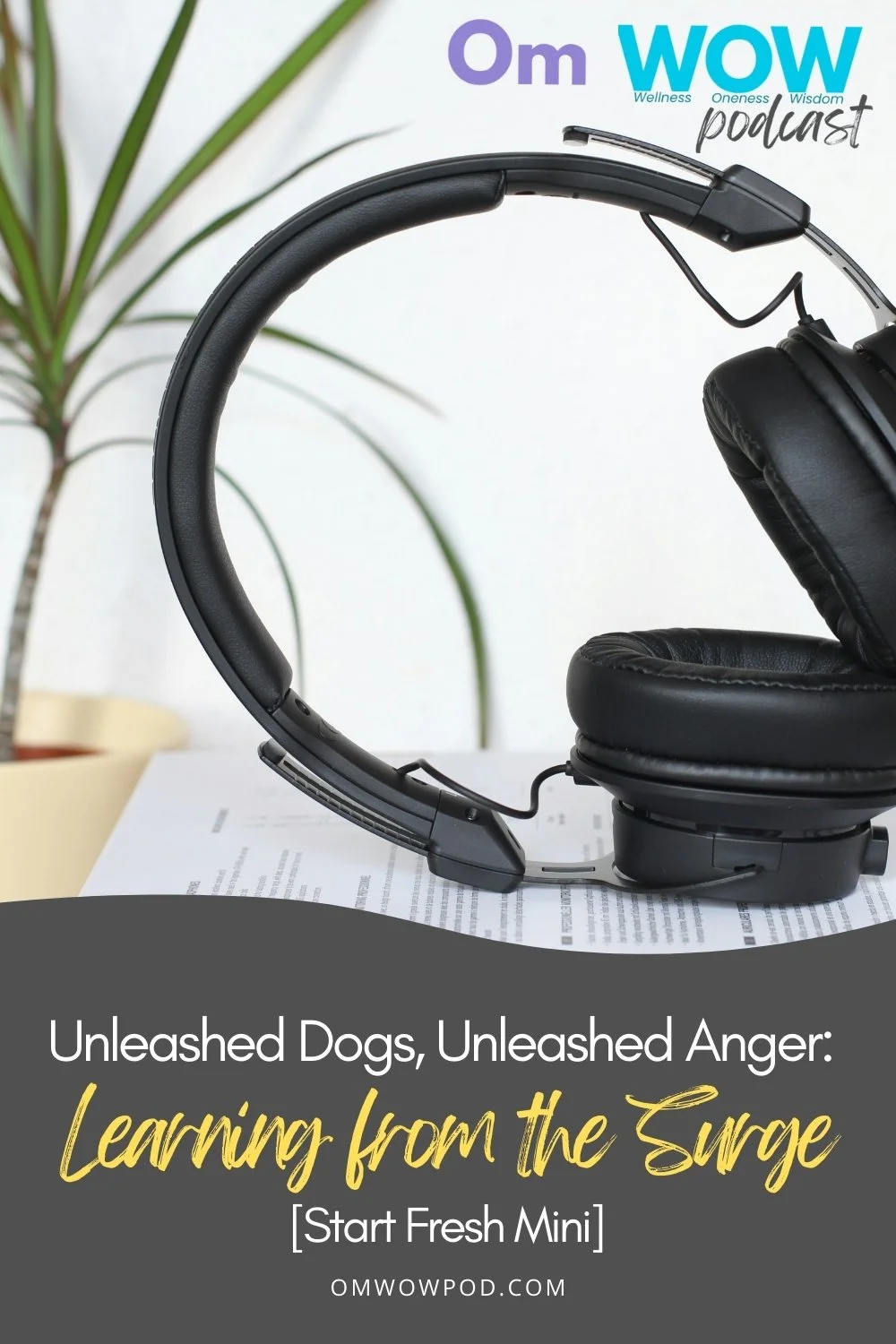🌼 Unleashed Dogs, Unleashed Anger: Learning from the Surge
Welcome to this Start Fresh mini from the Om WOW Podcast! Let’s reset our mindset and start the week with clarity and intention.
Listen to the short episode:
Episode 10: Transcript
Picture this. It's 8:00am. I'm drinking coffee in my PJ's at my desk, when suddenly I hear yelling and all this commotion in the woods behind my yard. I look out and see a large loose dog running around my yard. He's pacing back and forth around my chicken coop. My poor hens scattered in every direction, feathers were flying, they were squawking...
I heard a person yelling and eventually they got their dog to run out of my yard and go back to them. I guess this owner was completely oblivious to the chaos that their unleashed pet had just caused because there was no apology and they didn't even look to see if their pets had done any damage. I was livid!
Next morning, same thing happens again. Same dog, same chaos, same irresponsible owner. But this time something different happened inside me. I felt that familiar surge. You know the one that starts in your chest and spreads through your arms and makes your face feel hot? I was furious, not just annoyed, but genuinely angry at this person's complete disregard for my property, my animals, and just basic neighborhood courtesy and common sense.
This time I was dressed, so I ran outside and yelled "No!" to the dog and screamed toward the woods in kind of a witchy voice. "Get your dog on a leash. I have chickens!" The response that came back was a casual, "Oh, is he in your yard?" Duh! I screamed back "Yes, yesterday and today, and I have chickens! Get your dog!" Again.
No apology, no concern for whatever happened at my house. The owner just went on with their walk. The woods behind my house are deep, so unfortunately I couldn't see the person. I was also angry about this person's lack of concern for the safety of their own dog.
Besides our chicken coop, we have four beehives surrounded by a live electric fence. And at one point this dog ran around the side of my house to the front yard, which is pretty close to the road too. So I was concerned about it getting hit by a car.
I kid you not, I felt like I was on fire. Boiling from within. And my body was physically shaky, almost like the onset of a panic attack. After a few moments, I thought to myself, "Hmm, why is this anger sticking in me so hard?" because the feeling just wouldn't pass. That moment made me realize something important about anger.
It doesn't just happen TO us, it happens THROUGH us. And if we understand how it works, we can learn to work with it instead of being controlled by it. I dealt with the situation as tactfully as I could manage in the moment. But what really bothered me was the lingering burning anger that remained with me even hours after this was all over.
I was rerunning the situation in my head and getting angry every time I thought about it. Why did I keep thinking about it? Have you ever done that? Sometimes we'll replay something that happened and think, oh, I should have said this, or maybe I could have done that, or next time I'm gonna say this. Pointless.
For our family, it spurred a conversation about moving up a project to fence in part of our backyard because unfortunately, this is an issue that seems to be getting worse. With more and more random dogs showing up in my backyard with their humans nowhere in sight. Beyond the anger about the safety of my chickens and our own dogs, I was angry about the rush and expense of now likely needing a fence because other people can't be responsible with their own dogs.
The Science Behind the Surge
Okay, let's talk about the science behind the surge of anger. According to research published by the National Center for Biotechnology Information, the overall lifetime prevalence of anger problems in the general population is estimated to be just shy of 8% (McLaughlin, Green, Hwang, Sampson, Zaslavsky, & Kessler, 2012). That means nearly eight out of every a hundred people will struggle with significant anger issues at some point in their lives.
But here's what's fascinating. Anger is not inherently bad, it's actually a protective emotion. It’s your brain's alarm system telling you that something important to you is being threatened. The problem isn't the anger itself, it's what you do with it. There's wisdom in this anonymous saying that's often misattributed to Buddha: "Holding onto anger is like drinking poison and expecting the other person to die." Regardless of where it came from, the truth remains. Unmanaged anger hurts US more than anyone else.
Recognizing the Early Warning Signs
How can we recognize the early warning signs of anger? Your body gives you signals. You just need to learn to recognize them. Here's what to watch out for. There's physical signals. Your heart rate increases, your breathing gets shallow. You tense up your muscles.
You'll feel this, especially in your jaw, your shoulders. Sometimes you close your hands into fists. You might feel heat in your face or chest. And some people even experience like a narrow, sharp vision with their eyes.
And there are mental signals. Your thoughts can start racing. You might have an urge to act immediately. Maybe you're starting to rehearse what you wanna say. And there are emotional signals. You might feel a sense of injustice or that you've been violated, or you have an urge to fight back or defend yourself. You might experience a feeling of being misunderstood or disrespected.
If possible, and if this situation safely allows for it. The key is catching these signals early before you've moved from feeling angry to acting on that anger. Sometimes the situation requires you to respond immediately. Like in my case where there was danger to both my own animals and the dog running loose near the electric fence around our bees.
STOP: Your Emergency Anger Brake
When you notice the early warning signs of anger and it's not an emergency where you need to respond immediately, try this technique from Dialectical Behavior Therapy (DBT) developed by Dr. Marsha Linehan:
S = Stop. Stop what you're doing. Literally pause. Don't speak. Don't act, just stop.
T= Take a breath. Not just any breath, a deep, intentional breath. This activates your parasympathetic nervous system and starts to calm your body's fight or flight response.
O =Observe. Observe what's happening. Notice your physical sensations, your thoughts and the situation around you. Ask yourself, what am I feeling? What am I thinking? What's really happening here?
P = Proceed. Proceed with intention. Now you can choose your response instead of just reacting automatically.
Deep Breathing Reset
Whether you're able to use the STOP technique or if you had to deal with the situation immediately, the next step to getting your body back in balance and calming yourself down is to do a quick, deep breathing reset.
Start by breathing in deeply and slowly for four counts. Then hold your breath for two counts. Exhale slowly for four counts, and then you just repeat that a few times. This pattern helps reset your nervous system and gives your prefrontal cortex (that's the thinking part of your brain) time to come back online.
Shake, Shake Shake!
Next, I'd like to recommend something that might seem silly, but if you're alone, stand up and shake your body. Wiggle like you're shaking off the anger. This is an energetic reset, and it's been observed in the wild as something animals do instinctively after a fearful event like being chased by a tiger. After the threat is gone, they will kind of twitch and shake and then get up and move on with their lives as if it never happened. Wouldn't you like to move on with your day like whatever made you angry or upset never happened?
And EFT Tapping works phenomenally in situations like this. In five to 10 minutes, you can do a short tapping sequence and bring yourself back to a peaceful, calmer state. (If you don't know EFT, get the EFT Tapping Quickstart Guide here).
The Reality Check Questions
It's also helpful to ask yourself these grounding questions:
Will this matter in five years? Five months, even Five days?
What would I advise my best friend if they were in this exact situation?
What story am I telling myself about this situation? And could there be another explanation?
For example, you see a reckless driver coming up behind you quickly. They pass you and the car in front of you. And then a few minutes later, you see them turn off the road onto a side street. Instead of thinking they're an irresponsible, reckless jerk, perhaps consider some possible alternatives of why they needed to get home so quickly. Did one of the kids just call with an issue? Is the basement flooded? Is there a stranger poking around the yard?
You will never know, but your own attitude and mood will be incredibly different if you imagine a different story surrounding this situation. Otherwise, will you continue driving with a bitter attitude because of that quick experience that's now over? Why? It's just not worth it.
Creating Space for Perspective
Sometimes even after breathing and questioning, you do still feel angry, and that's okay. Anger doesn't have to disappear completely for you to respond wisely. Sometimes you just need to create some space. Remove yourself from the situation if possible, take a walk, step outside or go to another room. I got off the highway once at an exit I didn't need, just to get away from three hot rods racing down the highway in and out of cars around me that were making me feel unsafe and nervous.
If it's an interpersonal communication situation, tell yourself and others if needed. "I need a few minutes to think about this before responding." Did you get an email that has your blood boiling? This is a good time to give yourself some time and space before responding harshly and potentially regretting your words later.
Long-Term Strategies
Managing anger isn't just about crisis moments, it's about building your overall emotional resilience. Here are some ongoing practices that can help:
Regular exercise helps burn off stress hormones and builds your tolerance for frustration.
Getting enough quality sleep helps you regulate your emotions.
Good nutrition supports your emotional regulation too.
Mindfulness or meditation practices strengthen your ability to observe your thoughts and feelings without being controlled by them.
EFT Tapping helps you keep your body and mind calm. (Listen to episode #3 to learn more about EFT)
Moving Forward with Wisdom
Remember, the goal isn't to NEVER feel angry. The goal is to feel your anger, learn from it, and respond in ways that align with your values and long-term wellbeing. That also means shaking off the anger and returning yourself to a peaceful state. Like my experience with the unsupervised dog, anger often shows us what we care about. In my case, the safety of my animals, and respect for shared community spaces.
Your anger is information. Your response is your choice. And with practice, you can get better at making choices that serve you, your relationships, and your peace of mind. As you head into this week, pay special attention to any bits of anger you feel rising up in you.
Don't let them boil over. Try some of the strategies we talked about today. Have a great week!
If this mini gave you a mindset boost, pass it on! Comment below & let me know— your energy makes a difference.
Meet Our Host: Jennifer Robin O’Keefe
Jennifer Robin serves as a relatable, down-to-earth, REAL Wellness & Success Coach. She’s not a fancy, perfect makeup, airbrushed kind of woman. She’s been told many times, in a variety of environments, that she’s easy to talk to, and makes others feel welcome and comfortable. Her mission in life is both simple and profound: to make others feel worthy.
Professionally, Jennifer holds several wellness certifications including Emotional Freedom Technique (EFT) Tapping, Thought Field Therapy (TFT) Tapping, Reiki, and more. She continuously expands her knowledge in the fields of Qi Gong, Xien Gong, Vibration/Energy Wellness and Natural Health. She also studied extensively with Jack Canfield, and serves as a Certified Canfield Trainer, authorized to teach "The Success Principles."
She’s an active reader and researcher who loves to learn, and one of her biggest joys is teaching and sharing what she’s discovered with others.
Links Mentioned:
Resources:
Linehan, M. M. (2015). DBT skills training handouts and worksheets (2nd ed.). Guilford Press.
McLaughlin, K. A., Green, J. G., Hwang, I., Sampson, N. A., Zaslavsky, A. M., & Kessler, R. C. (2012). Prevalence and correlates of anger in the community: Results from a national survey. CNS Spectrums, 17(2), 89-102.









